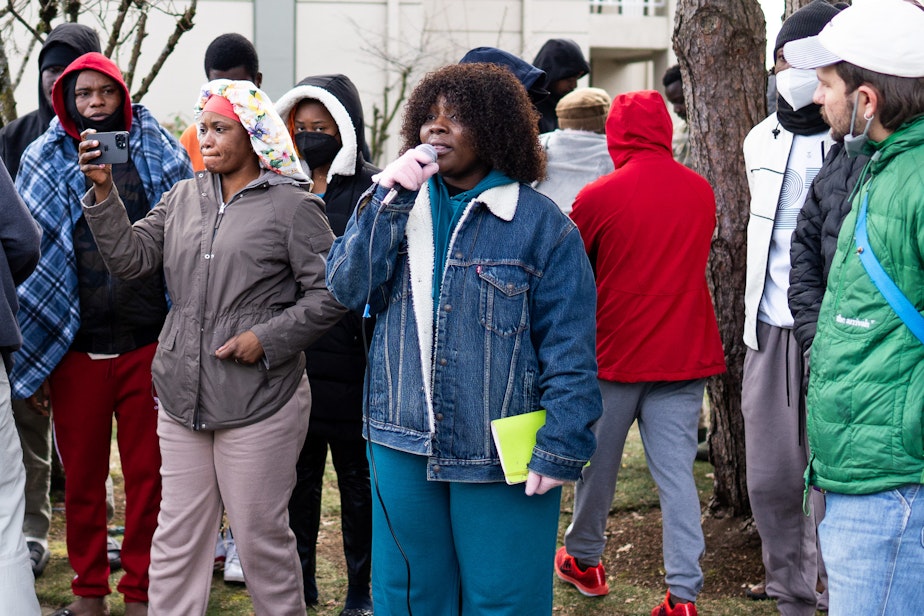'Help us.' Tukwila asylum-seekers take refuge in hotels as permanent shelter, warmer weather evades them

Following last week’s cold snap, asylum-seekers temporarily housed in hotels were supposed to head back to their camp near a Tukwila church. Instead, around 100 tried to stay past check-out time at the Homewood Suites in Tukwila, until other temporary housing was secured.
They’re asking the state and the City of Tukwila to help keep them out of the winter weather.
In the seven months since she arrived in the Seattle area, 23-year-old Angelica Paulina David Alberto, from Angola, has been going to school and living in a tent outside of Riverton Park United Methodist Church. As temperatures dropped well below freezing over the weekend, organizers with the county, church, and mutual aid groups worked together to put her and other asylum-seekers up in a hotel.
David Alberto said she was glad to be indoors, adding that it’s a joy to have a comfortable bed and heating, and to be away from the insects, rats, and diseases found around the encampment.
“That’s why we’re here — crying out, asking, appealing to local and state governments: Help us,” she said in Portuguese.
The asylum-seekers left the Homewood Suites on Wednesday after city officials arrived to transport them back to the encampment. Some are being resettled into a different hotel in Kent; others probably won’t be so lucky.
RELATED: For these asylum-seekers, a Tukwila church offers temporary comfort and refuge
Mike Faulk, a spokesperson for Gov. Jay Inslee's office, said Inslee has requested increased funding in the state budget for programs that could help people like Angelica, which the state legislature will have to approve. That money wouldn’t arrive until later this year.
“Notably, there isn’t a federal financial program that specifically supports asylum-seekers,” Faulk said.
U.S. Congresswoman Pramila Jayapal (D-WA) sits on the Subcommittee on Immigration Integrity, Security, and Enforcement, and also represents Washington state’s 7th district. Last month, Jayapal and other Democratic Washington state congress members sent a letter to the Federal Emergency Management Agency (FEMA), asking for funding under the agency’s Shelter and Services program to help house asylum-seekers in the state.
“Once we approve the budget for this last fiscal year, and we get those dollars flowing, that will bring money in,” Jayapal said. “It won't be targeted specifically to the housing of migrants in Tukwila, but our hope is that it can free up other resources.”
Meanwhile, the threat of a government shutdown looms in Washington, D.C., due to the partisan divide over immigration policy — a shutdown which would impact local asylum-seekers.
In King County, many asylum-seekers have pending immigration applications, a federal process which affects how soon they can become authorized to work in the U.S. They won’t be able to secure housing through county and state programs unless those applications are approved. Some asylum cases can take more than a year to be processed, which is why many are living in tents.
In the near-term, the King County Regional Homeless Authority can provide hotel vouchers for temporary situations like this past weekend. But it says it didn't have enough money to provide hotel vouchers for everyone who needed one, and it’s looking to state and federal partners to help with solutions.
Thrive International is a nonprofit that was contracted out by the county’s Department of Community and Health Services to put people up in hotels and other housing. Neither entity responded to KUOW’s requests for comment.
Riverton Park United Methodist Church paid to put people in hotels during this latest cold snap. Palmira Figueroa, a contractor with the nonprofit immigrant advocacy group OneAmerica, helps coordinate with various partners involved in this effort, including a state task force created to address the influx of asylum-seekers, which works with the City of Seattle and King County.
At the same time, the Pacific Northwest Organizing Chapter of International Migrants Alliance, and the newly formed Mãos Unidas Pela Solidariedade, a mutual aid group formed to support new arrivals in the area, are also fundraising to pay for housing. They also hope to find more cost-effective ways to house people as they wait for jobs and navigate limited legal services.
Laurinda Madidilo Andre arrived in the Seattle area as an asylum-seeker three years ago and is an organizer for Mãos Unidas Pela Solidariedade. Madidilo Andre said it cost $5,000 to house 100 people for a night at Homewood Suites, and she’s concerned the money nonprofits receive to help asylum-seekers isn’t making its way to those in need — a sentiment echoed by other housing advocates.
“We know that there are many organizations that are trying to help us,” Madidilo Andre said. “All of the organizations that want to help [should] come directly to us.”
As of Wednesday night, Mãos Unidas Pela Solidariedade has raised $2,500, which will cover 20 rooms at a hotel in Kent for five nights.

